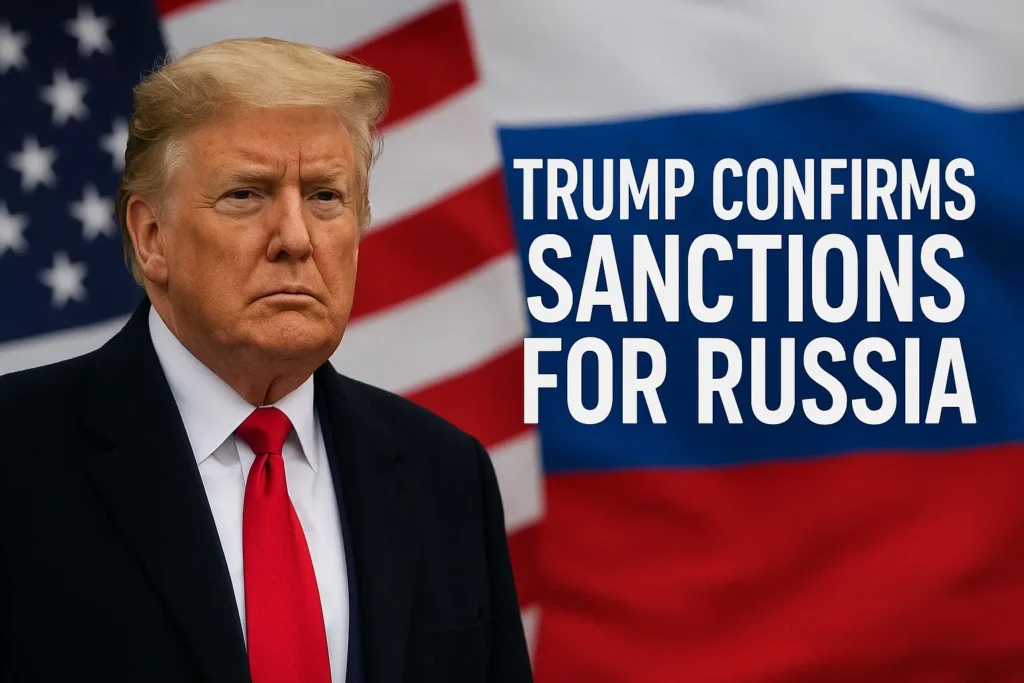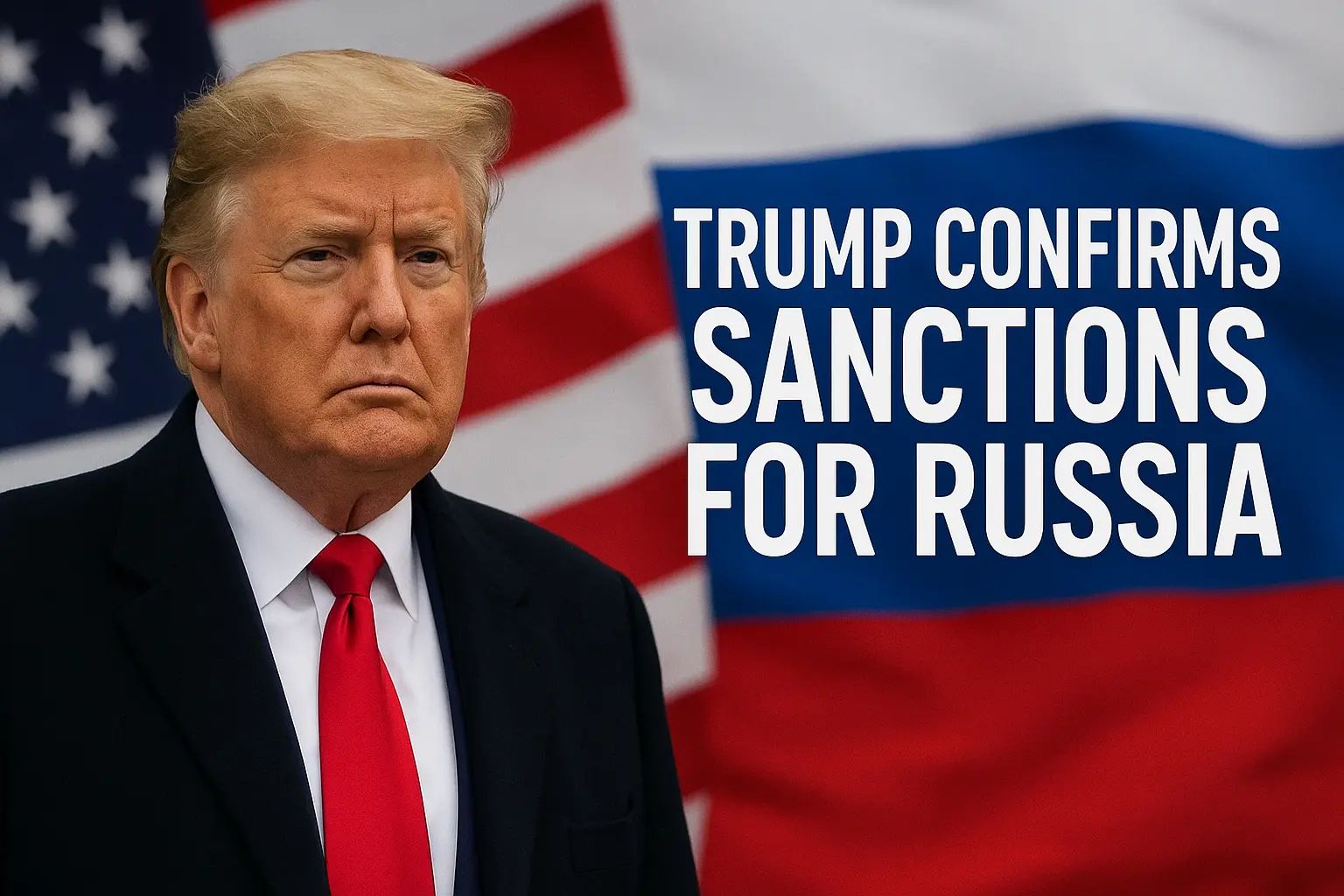U.S. President Donald Trump announces ‘economically severe’ sanctions on Russia over the Ukraine conflict ahead of his meeting with Vladimir Putin in Europe. Here’s the latest live coverage and global market reaction.
Introduction
In a move that could send shockwaves through global markets and reshape geopolitical alliances, U.S. President Donald Trump has confirmed that his administration will impose what he calls “economically severe” sanctions on Russia over its actions in Ukraine. The announcement came just hours before Trump is scheduled to meet Russian President Vladimir Putin in Europe, setting the stage for a tense diplomatic showdown with wide-ranging consequences.
The decision underscores Washington’s growing frustration with Moscow’s continued military aggression and territorial ambitions in Ukraine — a crisis that has already strained East-West relations to their breaking point.
Trump’s Sanction Strategy: Economic Pressure with Global Reach
President Trump did not mince words during a press briefing in Brussels before his flight to Helsinki. He emphasized that the sanctions package will be the toughest economic action yet taken against Russia in response to its ongoing war in Ukraine.
“These will be economically severe sanctions — far stronger than anything we’ve done before,” Trump stated. “The message is clear: The U.S. will not tolerate violations of international sovereignty and aggression toward our allies.”
While the exact measures have not been officially disclosed, senior administration officials have hinted at targeting Russia’s:
- Energy exports – particularly oil and gas pipelines to Europe
- Financial institutions – cutting access to global payment systems
- Defense sector – blocking technology transfers and international contracts
- High-net-worth individuals – freezing overseas assets linked to the Kremlin elite
Global Reactions: NATO Allies and European Leaders Respond
The announcement was met with mixed reactions across Europe. NATO allies largely welcomed the move, viewing it as a sign of U.S. commitment to the defense of Eastern Europe.
German Chancellor Olaf Scholz called the sanctions “a necessary response to clear violations of international law,” while French President Emmanuel Macron warned that Europe must prepare for possible retaliation from Moscow, including energy supply disruptions.
However, some EU officials expressed concern that the sanctions could also have collateral economic damage on European industries, especially in the energy and manufacturing sectors.
Markets React: Oil Prices, Ruble, and Euro Under Pressure
The sanctions news had an immediate impact on global markets.
- Oil prices surged past $90 per barrel amid fears of supply disruptions.
- The Russian ruble plunged to a 12-month low against the U.S. dollar.
- The Euro dipped slightly against major currencies on worries over higher energy costs.
- U.S. defense stocks rallied, with companies like Lockheed Martin and Raytheon Technologies seeing sharp gains.
Investors are bracing for heightened volatility as the sanctions take effect and Russia’s counter-measures become clearer.
Putin Meeting: High Stakes Diplomacy in Europe
Trump’s upcoming meeting with Vladimir Putin — now framed against the backdrop of these sanctions — will be closely watched by global leaders, analysts, and markets.
The Kremlin has already labeled the sanctions “an act of economic warfare” and warned that Moscow will respond “swiftly and decisively.”
Diplomatic experts believe the meeting will focus on:
- Ukraine conflict de-escalation talks
- NATO’s expanding presence in Eastern Europe
- Energy supply agreements and pipeline politics
- Cybersecurity and espionage accusations

Ukraine’s Response: Strong Support for Sanctions
Ukrainian President Volodymyr Zelensky welcomed the sanctions, calling them “a strong step toward justice.” He emphasized that the measures would weaken Russia’s ability to fund its military aggression and strengthen Ukraine’s position in future peace talks.
Zelensky also urged European nations to maintain unity, warning that “Moscow’s strategy is to divide the West through energy blackmail and propaganda.”
The Bigger Picture: Why This Matters Globally
These sanctions are not just a regional issue — they carry significant global economic and political implications:
- Energy Security: Europe’s heavy reliance on Russian gas could trigger a search for alternative suppliers, benefiting U.S. LNG exporters and Middle Eastern producers.
- Financial Systems: Russia’s exclusion from international banking networks could accelerate its pivot toward China and alternative payment systems.
- Military Alliances: NATO’s cohesion will be tested as members balance security priorities with economic realities.
Possible Russian Counter-Moves
Moscow has several potential levers to respond, including:
- Restricting natural gas exports to Europe, particularly during the winter.
- Imposing bans on Western agricultural products.
- Expanding military cooperation with non-Western countries like Iran and North Korea.
- Accelerating its de-dollarization strategy in trade settlements.
Live Updates: Europe on Edge
As this is a developing story, updates from Brussels, Washington, and Moscow are coming in rapidly. Markets remain volatile, and diplomatic channels are working overtime to prevent the standoff from escalating into a broader economic or military conflict.
We will continue to track:
- Statements from NATO leaders following the sanctions announcement.
- Putin’s first response upon meeting Trump.
- Any emergency measures from the European Central Bank to cushion economic fallout.
Conclusion: A Defining Moment in U.S.-Russia Relations
Trump’s decision to announce sweeping sanctions just before meeting Putin signals a hardening U.S. stance on the Ukraine crisis. While the sanctions may hurt Russia economically, they also risk sparking a broader geopolitical confrontation with ripple effects across energy markets, global trade, and diplomatic alliances.
The coming days will determine whether these measures lead to a breakthrough in peace negotiations or deepen the divisions that have defined the post-Cold War era.

Also check It
Inflation Holds Steady at 2.7%, But Trump’s Tariffs Push Up Prices for Key Goods
How to Refinance Your Mortgage in 2025 (Step-by-Step Guide to Big Savings)
AI Search Startup Perplexity Shocks Tech World With $34.5 Billion Bid for Google Chrome
US Dollar Holds Firm Ahead of CPI Report and China Tariff Deadline
Oil Prices Dip as Geopolitical Optimism and U.S. Tariffs Weigh on Markets
